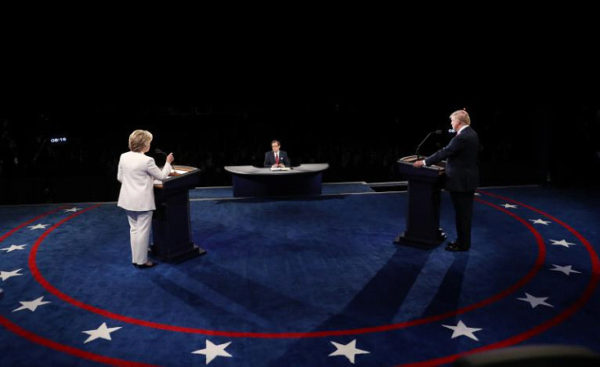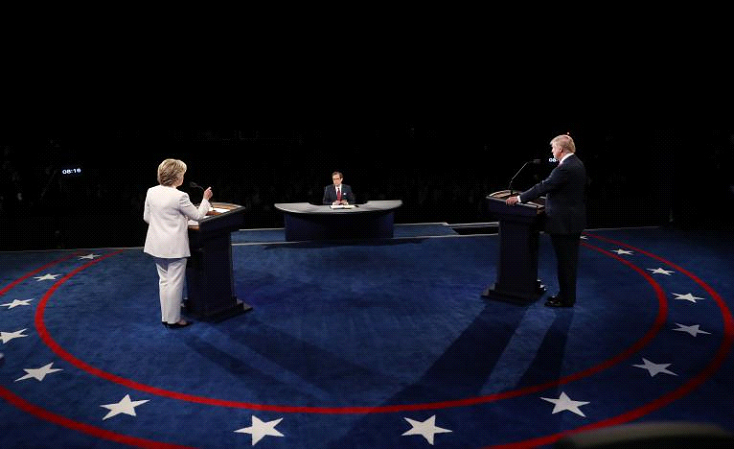LAS VEGAS, (Reuters) – Republican Donald Trump said yesterday he might reject the outcome of the Nov. 8 U.S. presidential election if he loses, an unprecedented challenge to a cornerstone of American democracy.
During the last of three debates against his Democratic rival Hillary Clinton, Trump was asked by moderator Chris Wallace whether this meant the New York businessman would not commit to a peaceful transition of power.
“What I’m saying is that I will tell you at the time. I’ll keep you in suspense. Ok?” Trump replied.

Clinton, the former U.S. secretary of state, said Trump’s comment was “horrifying.”
“That is not the way our democracy works,” she said. “We’ve been around for 240 years. We’ve had free and fair elections. We’ve accepted the outcomes when we may not have liked them. And that is what must be expected of anyone standing on a debate stage during a general election.”
In a debate that for the first time focused more on policy than character, the two candidates nonetheless lashed out at each other.
Trump, 70, called Clinton “such a nasty woman,” accused her campaign of orchestrating a series of accusations by women who said the businessman made unwanted sexual advances and said that both she and President Barack Obama were behind disturbances at his rallies. He said the Clinton Foundation was a criminal enterprise and as a result she should not have been allowed to seek the presidency.
Clinton, 68, said Trump himself had incited violence, belittled women and posed a danger to the United States. She said Trump, a former reality TV star, had in the past also complained that his show was unjustly denied a U.S. television Emmy award.
“I should have gotten it,” Trump retorted.
Trump said all of the stories about sexual misdeeds were “totally false.” He called the Clinton campaign “sleazy” and said, “Nobody has more respect for women than I do, nobody.”
Clinton said the women came forward after Trump said in the last debate he had never made unwanted advances on women. In a 2005 video, Trump was recorded bragging about groping women against their will.
“Donald thinks belittling women makes him bigger. He goes after their dignity, their self-worth and I don’t think there is a woman anywhere who doesn’t know what that feels like,” said Clinton, the first woman to win the nomination of a major U.S. political party.
Clinton, the first woman to win the presidential nomination of a major U.S. political party, said Trump had maligned many different groups.
“This is a pattern. A pattern of divisiveness, of a very dark and in many ways dangerous vision of our country where he incites violence, where he applauds people who are pushing and pulling and punching at his rallies. That is not who America is,” she said.
Trump entered the debate hoping to reverse opinion polls tilting away from him. Trump has raised concerns by claiming the election will be rigged against him, and has urged supporters to patrol polling places in inner cities to prevent voter fraud.
The two presidential rivals had tough but issues-based exchanges on abortion, gun rights and immigration during the 90-minute showdown, but occasionally reacted angrily.
Clinton said she would raise taxes on the wealthy to help fund the U.S. government’s Social Security retirement program, but suggested Trump might try to find a way out of paying the higher taxes.
It was then that Trump asserted Clinton was “such a nasty woman.”
Mexico’s peso currency, seen as a measure of Trump’s prospects, firmed to its highest level in six weeks at the end of the debate, suggesting growing investor confidence of a Clinton victory. Trump has vowed to build a wall on the border with Mexico to keep out illegal immigrants and has said he would make Mexico pay for it.
A CNN snap poll said 52 percent thought Clinton won the debate while 39 percent said Trump was the victor.
Trump and Clinton battled sharply over the influence of Vladimir Putin, with Clinton calling Trump the Russian president’s puppet and Trump charging Putin had repeatedly outsmarted Clinton.
Clinton and Trump walked straight to their podiums when they were introduced at the University of Nevada, Las Vegas, once again forgoing the traditional handshake as they did at the second debate last week in St. Louis, Missouri. This time they did not shake hands at the end of the debate either.
Clinton has struggled to get past concerns about transparency raised over her use of a private email server for work communications while she was secretary of state from 2009 to 2013.

